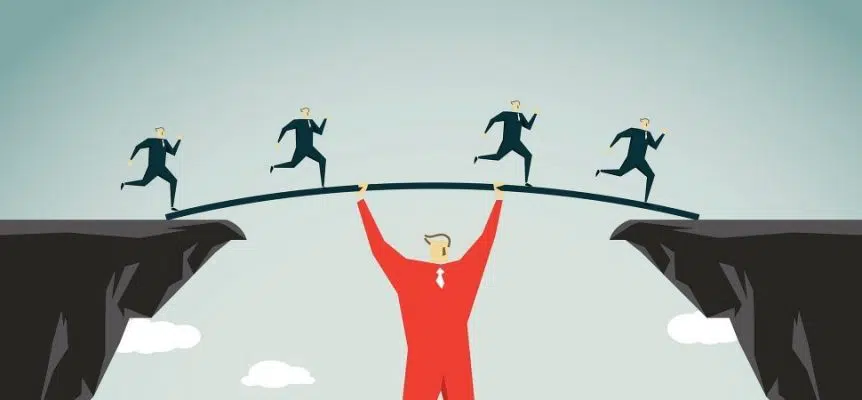We are truly living in unique times. The coronavirus pandemic is impacting everyone from our families, health care professionals, our people and the elderly. To date it has taken lives, jobs and cost billions in lost revenue, with zero growth forecasted in 2020. Given the state of the world and resulting economy, we think the leadership term VUCA: Volatile, Uncertain, Complex and Ambiguous (Bennis & Nanus, 1987) best describes these extreme conditions.
The COVID-19 fear is real, and what people believe will become their reality. On the one hand we want to be supported, and feel like we are in this together, yet on the other hand we are being prescribed the opposite, social isolation, social distancing, and self-quarantine. Given the unique circumstances the pandemic presents, it is quite possible that some less experienced leaders may feel that they do not have the experiential skill set to lead their people through the ambiguity.
As the situation continues to affect our world, and as we adjust to new norms, we wanted to reach out with some practical advice on how to lead your people through times of VUCA, and how you can keep supporting your employees, each other and your family.
Transparency
Transparency is key. Clear and consistent communication is the most important ability you must lead with. Our workforce is made up of many personalities, however, in times of VUCA, security and stability is paramount to your team. People want to know where they are at, so they can make personal contingency or continuity plans. What is being done, what is being said. Be transparent, be authentic. Leaders do not have to know everything, say what you do know but also what you don’t know. Leaders need to explain that we are in unchartered territory; nobody has all the answers.
Empathy and Listen
Lead with Empathy and Listen. Whilst in survival mode, your employees may not want to know the financial or strategic implications that the COVID-19 is having on your company. What they want is to for their leader to understand their world and what is required of them during this crisis. To know that their leader is not a robot, that he/she is feeling the effect of the pandemic as much as they are. Listen to your employees fears and concerns. The general population is frightened and are responding reactively. Leaders should be speaking to their team members to find what beliefs, assumptions and emotions are driving their thinking and decision making. It is the leader’s role to work towards reducing your employee’s collective fears and anxieties.
Continuously create new ideas for webinars for teams to come together, to discuss what’s happening in each other’s world, dealing with different issues and possible solutions people have. We encourage you to foster collaboration and to develop an understanding of how others perceive the unfolding crisis. Coming together as a virtual community is what we are to be encouraging.
More than likely, the feeling of uneasiness each of us is experiencing is grief. Grief for what we have lost and for the unknown. It is empowering to be able to name the emotion that we feel, and the way we experience it, in order to let it flow through us. Emotions need to be fluid, and they need release. If we allow the feelings to happen, they will happen in an orderly way, providing us with a sense of empowerment, rather than victimisation.
Agility
Lead with Agility. A VUCA environment requires a different leadership style, particularly when dealing with such an emotive issue as the Corona Virus. At this moment, we need to lead with Relationships. Except for essential cases, the strategic view of the company should be put on hold. We need to relate with our team members and lead with a participative style, to engage with consensus and connection. There will be an opportunity to ‘pick up where you left off’ and lead with a pacesetting style on the way up, however, now is the time for affiliation and engagement.
Engagement
Engage your teams. Remember a lot of your employees come to work for social interaction and mateship. It is difficult for those people who are in isolation (whether self or directed) to keep up motivation, morale and remain engaged. As best as possible, maintain consistency and routine. With technology making it easier than ever today to stay connected, it is imperative that we use the resources we have on offer. If you normally have a weekly meeting face to face, have it via skype, Zoom or Hangouts. This way you get a ‘visual’ on how people are really coping with the current situation. Remain in constant contact with your team members to maintain that sense of camaraderie with your team. Ultimately, remind your team that this is only a temporary measure. This too shall pass, until then embrace the new normal and be prepared to re-establish equilibrium after the fact.
Its ok, to isolate
Establish an ‘its ok’ to Self-Isolate culture. This is not the time to dust off your superman cape and bring it out, or hold a hero mentality to stay at work, nor is a time to state retribution if others take time out for appropriate self-isolation. It is imperative that we mean what we say. We need to encourage our team that is it ok to self-isolate, if need be. To be supportive both on and off the field. This relies on High Psychological Safety within your teams, which is generated from the top and cascaded down.
Opportunity
Be Proactive, create Opportunity. Think your way through this and how you want to come out the other side. Although your teams are in survival mode right now, this can be the time for innovative thinking. Look at LVHM, the company behind Louis Vuitton who turned 3 of their perfume lines into hand sanitiser lines.
Consider this moment to be a leadership opportunity for you too. Once all of this passes you will be jumping into a very fast paced environment and playing catch up. This will see you be stretched both mentally and physically. It will require you to self-manage and lead others in very different ways to how you would otherwise have led. Your soft skills will be required to be at the forefront of your job roles as you create cultures of trust and agility. Utilise this time to continue your professional development, understand the required leadership style that the post COVID-19 will require, and more importantly understand yourselves, your strengths and your concerns. Adaptability, resilience and transparency will be key in the upturn.
2020: Two Semesters.
As the Prime Minister has suggested, this year will be monitored through the lens of a first and a second half. As a whole 2020 will test the leadership of senior management and the ability of our organisation to navigate through uncertain times. The need to balance relationships and empathy, whilst still retaining a steady rudder to ensure business continuity, must be at the forefront of leaders’ minds.
The first half will be leading people through VUCA. Dealing with safety, continuity and containment plans to ensure people feel safe and heard, will be key to maintaining a culture of trust and high psychological safety. In the current state, leaders need to be leading calmly and with high emotional intelligence. Decisions are to be made with empathy and awareness of others.
The second half will require leaders to show powerful and strategic leadership as they navigate their way out of challenges, losses or into new opportunity areas. Senior staff will need to be adaptable and open to new ways of doing things. Leaders will be required to utilise different leadership styles as the year progresses, and as the workforce traverses its way through different stages. As the world commences its recovery process, a ‘sense of urgency’ and a ‘hit the ground running’ approach will be warranted to make up for lost time, being mindful that the world will emerge a different place than it was 12 months ago.
As we all watch the world unfold today and navigate our own personal contingency plans our thoughts are with those affected by the virus. We wish them well, and we remain inspired by our front-line healthcare workers, and those who are caring for people around the world.
Kerryn Martorana is the Senior Psychologist & Professional Performance Coach for Lifeology – Psychology that inspires: Awareness, Growth and Change www.lifeology.com.au


